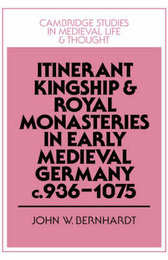
|
Itinerant Kingship and Royal Monasteries in Early Medieval Germany, c.936-1075
Hardback
Main Details
| Title |
Itinerant Kingship and Royal Monasteries in Early Medieval Germany, c.936-1075
|
| Authors and Contributors |
By (author) John W. Bernhardt
|
| Series | Cambridge Studies in Medieval Life and Thought: Fourth Series |
|---|
| Physical Properties |
| Format:Hardback | | Pages:400 | | Dimensions(mm): Height 224,Width 145 |
|
| ISBN/Barcode |
9780521394895
|
| Classifications | Dewey:943 |
|---|
| Audience | | Professional & Vocational | |
|---|
|
Publishing Details |
| Publisher |
Cambridge University Press
|
| Imprint |
Cambridge University Press
|
| Publication Date |
7 October 1993 |
| Publication Country |
United Kingdom
|
Description
In examining the relationship between the royal monasteries in tenth- and eleventh-century Germany and the German monarchs, this book assimilates a great deal of European scholarship on a central problem - that of the realities and structures of power. It focuses on the practical aspects of governing without a capital and while constantly in motion, and on the payments and services which monasteries provided to the king and which in turn supported the king's travel economically and politically. Royal-monastic relations are investigated in the context of the 'itinerant kingship' of the period to determine how this relationship functioned in practice. It emerges that German rulers did in fact make much greater use of their royal monasteries than has hitherto been recognised.
Reviews"...for anyone interested in medieval life and thought, his [Bernhardt's] book is indispensable." The Catholic Historical Review "The series in which John Bernhardt's book appears has provided us with some of the best monographs on the Middle Ages that have been written in English in recent years. His work, enriched by genealogical tables and maps, is a worthy addition to the series." Patricia DeLeeuw, Church History "He [Bernhardt] carefully qualifies the strength of his evidence, clearly saying when his argument is certain, what is difficult to estimate, and where it is impossible to determine. He acknowledges the controversies among historians and judiciously defends his own views through his evidence. And he carefully defines his terms, so that even a nonspecialist can follow his clear and careful reasoning." Speculum "This is an outstanding, original book. Bernhardt takes some things we have long known, adds a wealth of meticulous new research, and refashions old arguments in persuasive ways." Thomas F. X. Noble, Religious Studies Review
|